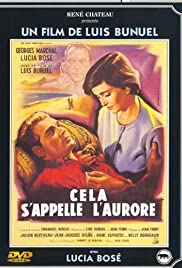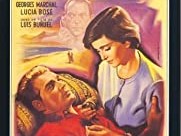Cela S’Appelle l’Aurore [That Is the Dawn] *** (1956, Georges Marchal, Lucia Bosè, Julien Bertheau, Giani Esposito) – Classic Movie Review 10,684

Director Luis Buñuel’s 1956 French-Italian film Cela S’Appelle l’Aurore [That Is the Dawn] is a rather straightforward sentimental love story melodrama with just the odd touch of the moral issues and no surrealism from Buñuel about a bored Corsican village physician, Doctor Valerio (Georges Marchal), who romances a beautiful widow (Lucia Bosè) when his younger, spoiled, bored wife Angela (Nelly Borgeaud) is away.
The woman abandons him when he offers refuge to a young worker-assassin, Sandro Galli (Giani Esposito), who is deeply love in with his sick wife Magda (Brigitte Elloy). Sandro is neglecting his duties as farm foreman for the town’s wealthy and powerful factory owner, Gorzone (Jean-Jacques Delbo) to give more attention to his wife.
As co-writer (adaptation) and director, Buñuel seems to enjoy adapting Emmanuel Robès’s novel, which he called ‘perfectly pure’, communicating his pleasure in the material. It was Buñuel’s first European film for nearly a quarter of a century. Marchal and Bosè both give outstanding performances.
Robert Lefebvre [Robert Le Febvre] shoots in black and white and Buñuel films in French.
Jean Ferry wrote the dialogue and worked with Buñuel on adaptation.
Also in the cast are Julien Bertheau, Henri Nassiet, Robert Le Fort, Simone Paris, Pascal Mazzotti and Gaston Modot.
Marchal played in three more Buñuel films.
Cela S’Appelle l’Aurore [That Is the Dawn] runs 102 minutes, is made by Les Films Marceau and Laetitia Film, is released by Les Films Marceau (1955) (France), is shot in black and white by Robert Lefebvre [Robert Le Febvre], is produced by Edmond Ténoudji, is scored by Joseph Kosma and is designed by Max Douy.
© Derek Winnert 2020 Classic Movie Review 10,684
Check out more reviews on http://derekwinnert.com


